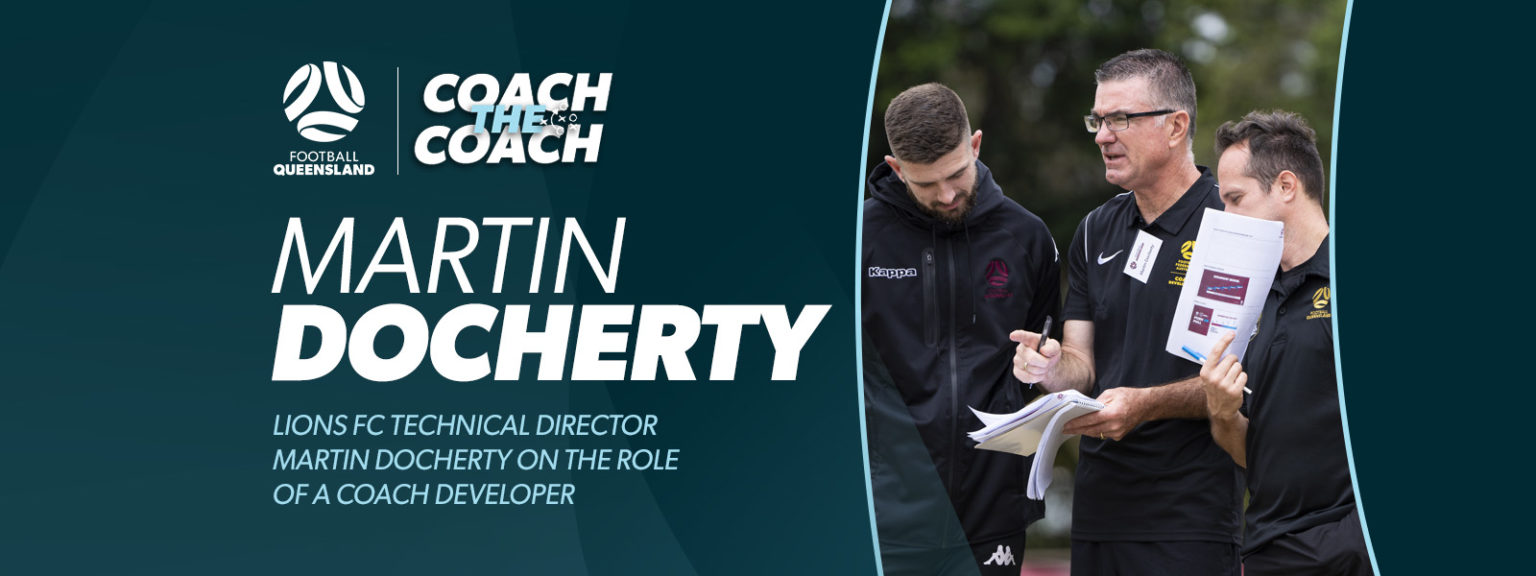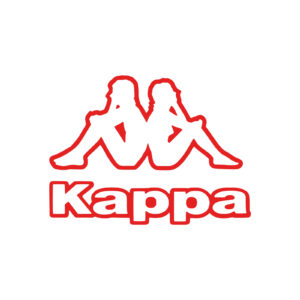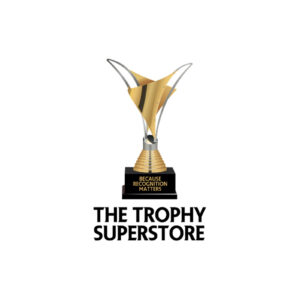A familiar face to members of the football community throughout Queensland, Lions FC Technical Director Martin Docherty has been helping develop grassroots coaches for over 13 years, first in Cairns and more recently in Brisbane.
Since 2021 he has delivered 21 courses to 289 coaches through his role with Lions FC, with every coach within the club now possessing a community coaching certificate as a minimum qualification thanks to his efforts.
Docherty sat down with Football Queensland to provide an insight into his role as a coach developer and the ways in which he is delivering both formal and informal learning opportunities for community coaches.
“Like everybody, I had this little bit of passion about giving back to the game at the grassroots level so again like most of us, I started sitting in on MiniRoos courses and the Skills, Game Training and Senior courses so that community space,” he said of how he got started as a coach developer.
“I spent probably two or three years with Chris Collins [former FNQ Football Development Manager] in Cairns just figuring out what people wanted and then how to actually impart your little bit of knowledge and expertise onto the audience and then engage them at the same time and allow them to walk away with something tangible, whether it be a training session or a word that you’ve used or even a different type of delivery style.
“Something I’ve always thought about is that a lot of coach developers and a lot of coaches are very similar in their style, so I’ve thought can I offer them something different.
“So that’s where it actually started all those years ago and I’m glad that as I’ve gone on in my journey, I feel that I’m still developing as a coach developer but I think I’ve got a distinct coaching style or teaching style now that has developed over the years.”
Having worked as a coach developer at the community level for the last decade, Docherty has learned the importance of tailoring his communication style to the audience of coaches he is working with.
“If you take it right down to the grassroots level, being a coach developer is… you’re a teacher, you’re a mentor and remembering that your audience is mums and dads and caregivers that have little or no knowledge of the game,” Docherty said.
“So you have to remind yourself that what you’re about to give them is something they’re going to deliver out in the community space or in the MiniRoos teams or in the Skills Training teams.
“You’ve got to make sure the information you’re giving is clear, that you’re not giving mixed messages on how you deal with children, how you deal with parents because you’re actually developing parents if you know what I mean, you’re actually working with parents who have little to no experience or knowledge.
“They just want to give something back to the game because their child happens to play the game, so I’m very mindful of being robotic in how we tell them how to deliver things; it’s almost like teaching them how to be a parent, but with a ball at your feet and having fun at the same time in doing it.
“And because I have three children, I correlate parental experiences to what it’s like on a Monday to Friday on the football field with children. So you’re effectively the facilitator of fun, and how you do that is your own little coaching style that you’ve got, but if you can do it in a non-threatening, fun, safe, secure environment then you’ll, not only me as the coach developer but you as the person will be deemed as a good coach and you’ll become better at that.
“It’s thinking about how you can implement the basics in a fun, safe and inclusive environment and I feel that that’s one of my strengths as a coach developer.”
Docherty described the role of a coach developer as being a sounding board for coaches, providing a person they can turn to to seek additional support and guidance.
“I’ll always say to coaches when I sit and watch a game on a Saturday, I’m not actually looking at the game, I’m actually looking at you and I just want to make sure you’re in a safe space,” he said.
“And that then transfers back to Monday to Friday at the training, I’m not out watching what you’re working on today, I’m there to say is everything ok, come on in and we’ll have a chat.
“You’re a sounding board for them, because in the world of coaching it’s a lonely place because you feel like you’ve got the weight of the world, you’ve got the children, the parents, the coaches, all these things happening.
“So I try to say to them let me focus on that side of it, you focus on these components of the training or the management part of the program, you focus on that and here are some tools that will help you along the way and don’t forget I’m always here for you.”
In addition to the formal learning opportunities delivered through coaching courses, Docherty also highlighted how crucial informal learning opportunities are in the ongoing support and development of a coach.
“At Lions, that consists of having one-on-one meetings with coaches on a daily basis, and they’re informal in the sense that all I’m ever asking them is ‘are you ok?’” he said.
“So I’m not there assessing their delivery or their delivery style, but I try and make sure that the coaches at any stage, and assistants for that matter, can feel comfortable that they can come and just talk to me about anything because as we know, 70% of the learning is informal learning, so it’s not actually coming to a course and learning at a course, it’s actually the ongoing learning that happens informally.
“If you can create a relationship and rapport with a person that they can pick up the phone or you can talk to them almost about anything, then I actually think that benefits their delivery style and the content they’re delivering because they’re relaxed and they’ve got that element of trust.”
Within his own club, Docherty is this week and next week running refresher MiniRoos courses for coaches at their training sessions and provided this as an example of how clubs can create more learning opportunities for their coaches at the community level.
“It’s not impacting on their time, it’s during the session that they’ll actually be conducting so there’s an opportunity for learning and growth and development in that fun, safe and inclusive environment that happens to be one of your training sessions,” Docherty said.
“So there’s that informal learning but it’s non-threatening, it’s all about what are you doing, show me how you deliver it, now could we add on a little bit by doing this.”
When asked how he gives feedback to the coaches he is working with, Docherty noted that the key where possible is to encourage self-reflection.
“I refrain always from giving my opinion because opinions are subjective so instead I’ll say ‘well could you look at it this way or possibly that way’, so you’ll pass it back to them in a different way even though you are challenging them to a certain extent but they don’t really realise,” he said.
“So it gets them thinking and they may then even ask the question again and they hear it and they go ‘actually that doesn’t sound right’ and they work it out themselves.
“That’s just through experience, I think that has come over the years from working with people.”
For Docherty, working so closely with aspiring coaches is what drives him.
“I’m one of the lucky ones who truly loves and is passionate about what I do on a daily basis and I don’t see it as work,” he said.
“I like the fact that I know I’m helping people, and I get that satisfaction knowing that this is actually helping these people and their environment.
“That’s the enjoyment I get out of it; my sole objective is to assist as many aspiring coaches as I possibly can.”
For coaches who are interested in moving into a coach developer role, Docherty reinforced the importance of starting at the grassroots level.
“The key is crawl before you walk. If you can put your community shoes back on, go back there where the real learning happens; that’s the real world is the community space, and spend some time in there effectively serving an apprenticeship and that would be delivering MiniRoos, Skills and Game Training certificates,” he said.
“Listen to the parents, learn from others and effectively seek a mentor, whether it’s inside the club or outside the club, or it might not even be someone who is involved in football; seek someone who you can actually pick up the phone and chat to.”
Coaches interested in learning more about coach developer opportunities or hosting coaching courses at their club should contact their local Club Development Ambassador for further information.
















